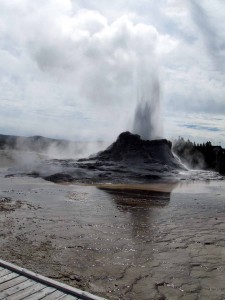
There are places on this earth that will make you think you have stepped into another dimension.
This is not a bad thing.
Getting lost at your own discretion can, in fact, be a very very good thing.
Make sure, while you’re at it, that you find someplace where phones, blackberries, computers and other modern day miracles simply don’t function. So you can leave them behind too. Just bring your curiosity, a willingness to be awed and your bearspray, and take off for the wilds. [More on Castle Rock geyser, pictured, here.]
Who knew there were dozens of geysers besides Old Faithful (which you can’t get close to and, compared to some of the other geysers, seems less than spectacular…perhaps because when viewing Old Faithful one is hardly lost.)
According to information supplied by the Park, geysers produce acids strong enough to eat through the soles of boots and hot springs run around 270 degrees F. Interesting enough – but put on your imagination and consider finding this place waaaaaay back in the 1800s and then trying to convince someone that it existed. (And yes, a dozen or so sillies have not heeded the warnings and have lost their lives.)

Which is why it’s good to get lost. You find things you never even thought of. And when you come back and tell the rest of the world, that telling can teach you to rely on your own senses no matter what anyone else believes or doesn’t. You’ve had an experience that may be unbelievable to those who have not had that experience. Don’t let them make you disbelieve. [More on Morning Glory Pool here]
This is where you learn to trust your eyes and your instincts (after all you wandered and returned safely, if changed a bit), and where you begin to truly understand the phrase “step into your power.” For if you have never wandered, how can you experience stepping apart from the whole and into your own special, one-of-a-kind self?
Here, Gary Snyder describes the etymology of the word “wild”
The word wild is like a gray fox trotting off through the forest, ducking behind bushes, going in and out of sight. up close, first glance, it is “wild”–then farther into the woods next glance it’s “wyld” and it recedes via Old Norse villr and Old Teutonic withijaz into a faint and pre-Teutonic word ghweltijos which means, still, wild and maybe wooded (wuld) and lurks back there with possible connections to will, to Latin silva (forest, sauvage) and to the Indo-European root ghwer, base of Latin ferus (feral, fierce…).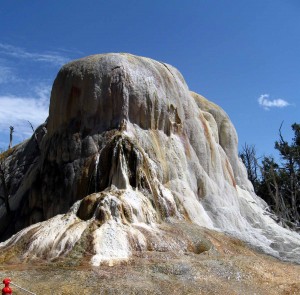
Renee Askins (she who returned wolves to Yellowstone Park) says:
Both [Gary] Synder [in “The Practice of the Wild“]and [Jack] Turner [who wrote “The Abstract Wild“] refer to Thoreau‘s use of “wildness” and its connection to “will,” or self-willed.” Inherent in the core meaning of wildness are the notions of autonomy, freedom, and self-determination. However, most definitions reach far beyond the idea of an individual’s experience to encompass the theory of a system that is self-informatin and self-organizing….the word “wilderness” need not be limited to describing a place or an experience; it can be used to capture a more elusive idea, as for example, in the phrase “the wilderness of the soul.” Wildness” is sometimes used to describe the fierce, elemental spirit that lives in us, underneath our civilized facades…to a part of us that remains undomesticated or unaltered from our original state. Some believe the wild is only accessible when one is teetering on the brink of survival…I think of it as being breathed by the world.
Which to me means that you can get properly lost in your chair or your backyard (see, I think you need Nature’s help in this, but maybe not) and “relinquish your former identity, and sacrifice the story you were living, the one that defined you, empowered you socially–and limited you. This sacrifice captures the essence of leaving home.” (Bill Plotkin).
In case you can’t tell, I’ve been reading a lot of new authors as I learn to get lost deeper in my own wilderness.
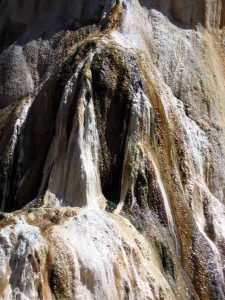
Before I sign off, I want to put one last bee in your bonnet: We are beyond lucky, we are wildly lucky (if you will) that we have had people who have fought for and saved wilderness for us to get lost in. You cannot know the place, and you cannot fall in love with it (or, in my case its denizens like the buffalo) if you don’t go. If you are not in love with a place, you will not lay down your life to make sure it continues for future generations. Getting lost isn’t just for you.
Wylde Women’s Wisdom
During your time as a Wanderer, the experience of soul encounter opens your consciousness to the central mysteries of your life, an opening that will guide the most creative choices of your adulthood and immeasurably deepen your appreciation of the world and all life. Your goal…,however, is not just a single glimpse of soul but a developing relationship, an ongoing conversation with those mysteries. 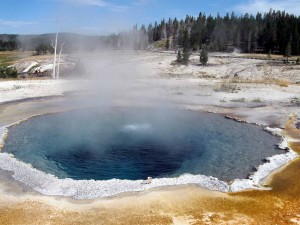 Through that conversation, your life, in later life stages, becomes mature art–the engaged, active embodiment of your deep imagination in service to an evolving world…During a soul encounter, you learn something about your destiny, which can be variously phrased as: why you were born, your mystical calling, what gift you’re meant to bring to the world, your one true life, the larger story you might live…. Bill Plotkin
Through that conversation, your life, in later life stages, becomes mature art–the engaged, active embodiment of your deep imagination in service to an evolving world…During a soul encounter, you learn something about your destiny, which can be variously phrased as: why you were born, your mystical calling, what gift you’re meant to bring to the world, your one true life, the larger story you might live…. Bill Plotkin
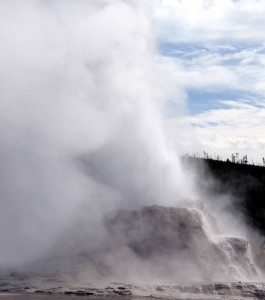



3 Comments
[…] that for being an edge walker! And now I understand my attraction last year to the buffalo in Yellowstone park. If they aren’t power as pure potential, I don’t know what is! Funny how things start […]
[…] that for being an edge walker! And now I understand my attraction last year to the buffalo in Yellowstone park. If they aren’t power as pure potential, I don’t know what is! Funny how things […]
[…] Post 6: You get lost. A lot. You are wandering in circles (which is really the Spiral Path, but you’ve […]